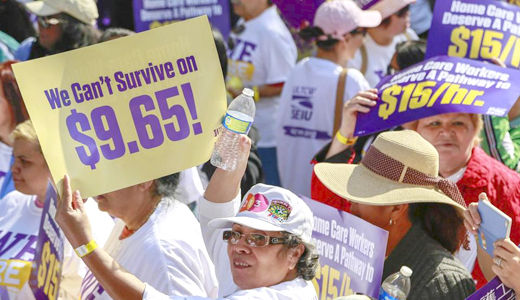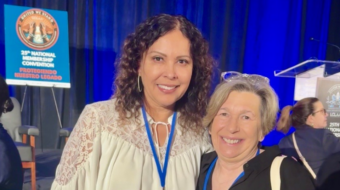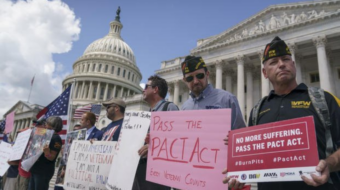
Amanda Sheppard, 33, has been a home-care worker for 10 years, caring for ill and elderly people in Vermont. Sheppard is also the president of Vermont Homecare United, a group that won its ability to collectively bargain for higher wages in 2013.
Before they were able to collectively bargain, some Vermont home-care workers were paid the federal minimum wage of $7.25 per hour. Some were earning a “day rate” of $2 to $3 per hour – even though they worked for an entire day. According to Sheppard, once the union bargained its first contract with the state in 2014, hourly wages increased to $10.80, and the day rate minimum pay became $160 for a full day’s work. These benefits were achieved for all Vermont home-care workers – not just those who identify as members of Vermont Homecare United.
“I knew home-care workers who had been working three jobs and still couldn’t make ends meet,” Sheppard told Truthout. “This collective bargaining contract helped so many home-care providers in Vermont.”
But soon after this 2014 contract was secured, the right-to-work movement – a movement that seeks to disempower collective bargaining and labor unions generally – won a US Supreme Court case that, based on a First Amendment argument, undercuts home-care workers’ collective bargaining activity. Home-care work is a field dominated by women and rife with low wages. The right-to-work movement may now succeed in undercutting collective bargaining across a range of sectors that are dominated by women if the Supreme Court again rules in favor of its First Amendment argument in Friedrichs v. California Teachers Association (CTA).
Feminist legal theorists have long argued that there are gendered implications of laws and policies that may seem “neutral” or rooted in constitutional doctrine. Indeed, the First Amendment argument touted by the right-to-work movement is a thin veil, underneath which lies a serious gender problem. Effectively, this argument is an attack on women’s economic security.
On January 11, the Supreme Court heard oral arguments in Friedrichs v. CTA, which could weaken collective bargaining for a range of public sector employees, including police officers, firefighters and nurses, in addition to teachers. The named plaintiff in the case is Rebecca Friedrichs, a third grade teacher in Anaheim, California. Friedrichs has been a teacher for nearly 30 years.
Represented by the Center for Individual Rights, Friedrichs and approximately 10 other plaintiffs are arguing that being required to pay agency fees, or “fair share” fees, to the CTA to help pay for the CTA’s work in bargaining for higher wages and better working conditions are in violation of their First Amendment right to free speech because she is not a member of the union and does not support its collective bargaining activities.
Agency fees, or fees paid by non-union members to support collective bargaining efforts, have been deemed constitutional for 39 years, since the Supreme Court ruled in Abood v. Detroit Board of Education. This case held that agency fees are not in violation of the First Amendment if they support “legitimate, non-ideological, union activities germane to collective-bargaining representation.” Even though she is not a member of the CTA, as a California teacher, Friedrichs benefits from the agreements the union secures through bargaining with the State of California.
Per Abood, Friedrichs and all teachers can also opt out of supporting any lobbying activity the CTA may engage in, so her money is not supporting political speech. As Justice Stephen Breyer said during oral arguments, negotiating for wages, hours and working conditions is “pretty far removed from the heart of the First Amendment.”
Breyer’s comment notwithstanding, early analyses of the oral arguments indicate that the court will side with Friedrichs, upending the longstanding precedent set by Abood v. Detroit Board of Education.
If the court does side with Friedrichs, many workers may choose to stop paying agency fees, thus gutting many public sector unions of a longstanding source of revenue that supports collective bargaining activity – which could negatively impact the many women who hold positions covered by collective bargaining agreements.
“Petitioners in Friedrichs are arguing that every time a union bargains, that is an inherently political act,” said Emily Martin, vice president and general counsel of the National Women’s Law Center. “That is a really naked attempt to strip ability for public sector workers to bargain for very basic protections like better wages and health benefits.”
Women represent the majority – 55 percent – of public sector employees, and women public sector employees like Friedrichs who are covered by union collective bargaining agreements are paid 24 percent more than women who are not covered by collective bargaining agreements, according to the National Women’s Law Center. The gender wage gap is also narrower among public sector union jobs: Women who are represented by public sector unions also tend to earn about 89.3 percent of what their male counterparts earn (as opposed to the standard wage gap of 78 cents on the dollar). Women in public sector unions are also more likely to have employer-based health-care coverage.
Thus eroding public sector unions’ collective bargaining prowess could affect the wages and working conditions of many women who hold secure union jobs.
Indeed, the right-to-work movement has consistently targeted women-dominated fields like home-care work and teaching. In the 2014 Supreme Court decision of Harris v. Quinn, the National Right to Work Legal Defense Foundation represented the plaintiff, a home-care worker named Pam Harris. Harris sued the State of Illinois and its governor, Pat Quinn, for assessing agency fees for the same reason Friedrichs is suing the CTA: Harris believed that the collective bargaining activity that her fees supported violated her First Amendment right to free speech. Harris said she opposed her home being a union work place.
The State of Illinois assessed these fees on all home-health aides who are paid by the state in order to support collective bargaining efforts of that sector. Several other states have similar practices, including California, Massachusetts, Missouri, Oregon and Vermont.
The Supreme Court disagreed with the State of Illinois’ argument that states do have authority to assess such fees “to support legitimate, non-ideological, union activities germane to collective-bargaining representation.”
At its core, the right-to-work movement is arguing that paying agency fees represents political speech. Labor organizers disagree.
“Our work is not political,” Sheppard told Truthout. “Unfortunately the right-to-work movement has turned us into commodities and assets. It’s like our health and our lives are commodities that we have to earn.”
One California study echoes the benefits of collective bargaining that Sheppard speaks to. It shows that home-care workers in San Francisco who are represented by collective bargaining agreements earn better wages, and are more likely to stay in the job for a longer period of time.
As a result of Harris v. Quinn, Sheppard says Vermont Homecare United’s revenue will now largely be dependent upon fees paid by their 1,300 members as opposed to the roughly 10,000 home-care workers in the state of Vermont.
Since home-care workers labor in individual homes as opposed to an office, communicating with her colleagues on wages, benefits and other issues germane to collective bargaining is not easy – making the revenue of agency fees even more critical.
“Home-care workers are spread throughout the state; we don’t have an office bulletin board where you can hear news and updates about wages changing or benefits being cut,” Sheppard said. “Our organizing is hard work.”
Vermont Homecare United’s contract must be renewed this year, and Sheppard is guardedly optimistic.
“We have faith that our contract renewal with the State of Vermont will sustain good terms,” she said. “But being able to ensure this depends on our strength as an organizing force.”
Now, if the Supreme Court’s ruling in Friedrichs mirrors Harris v. Quinn in assessing that agency fees are in violation of the First Amendment, the uncertainty Sheppard is facing could be something that teachers, nurses, police officers and firefighters’ unions will face going forward.
Katherine Myers has been an eighth grade writing teacher in Chicago for the past 20 years. She is also a Chicago Teachers Union (CTU) delegate at the Peck School in Chicago and a member of the CTU’s contract negotiation team, or “Big Bargaining Team.”
“As a union, the things we consistently ask for [through collective bargaining efforts] are librarians, nurses, social services, smaller class sizes, limits on high-stakes testing, racial equity across schools, and protection and retention of experienced teachers,” Myers told Truthout. “Our work is about the well-being of women and families.”
Both Friedrichs v. CTA and Harris v. Quinn are preceded by extensive state-level political activity by the right-to-work movement that also targeted women-dominated fields. Most prominently, in 2011, Gov. Scott Walker (R-Wisconsin) restricted the collective bargaining rights of teachers, nurses and child-care workers. (Walker deliberately excluded police and firefighters for fear that these employees would strike.) Michigan and Tennessee passed similar initiatives around this time.
Against the backdrop of overall gender-wealth disparities in the United States, the right- to-work movement’s erosion of collective bargaining capacity is even more alarming. Women systemically earn less than men across sectors. Women are more likely to fall into poverty in their elder years. Women often spend more on health care. And as they continue to be primarily responsible for unpaid domestic work, women are often struggling to care for children while working in low-wage sectors.
If strong public sector union jobs are eroded as a result of the right-to-work movement’s attack on agency fees, this will be an added setback for women’s economic status in the United States.
“Our organizing is about our quality of life,” Sheppard said. “Fighting to improve our quality of life is not political.”
Reposted from Truthout, with permission.
Sheila Bapat is a recovered attorney who now writes about gender and economic justice. Her first book, Part of the Family? Nannies, Housekeepers, Caregivers, and the Battle for Domestic Workers‘ Rights, was published by Ig Publishing in 2014.
Photo: Home health care workers rallied for better wages in Los Angeles in April, 2015. AP file photo.










